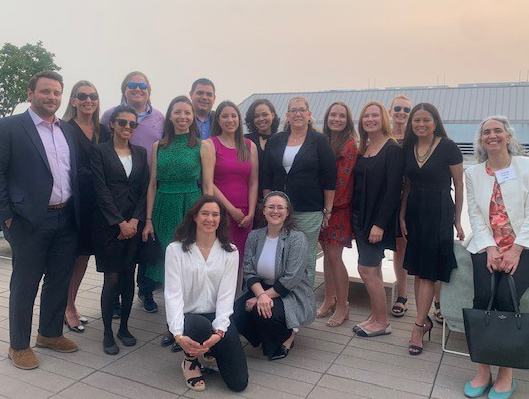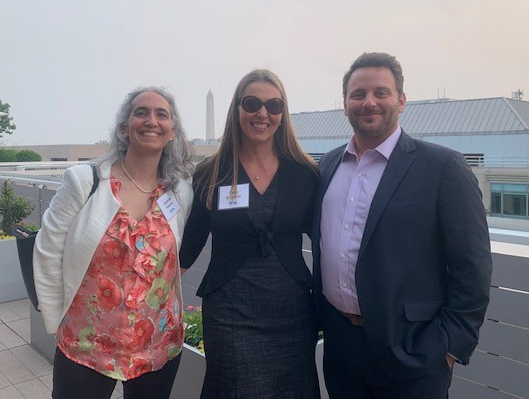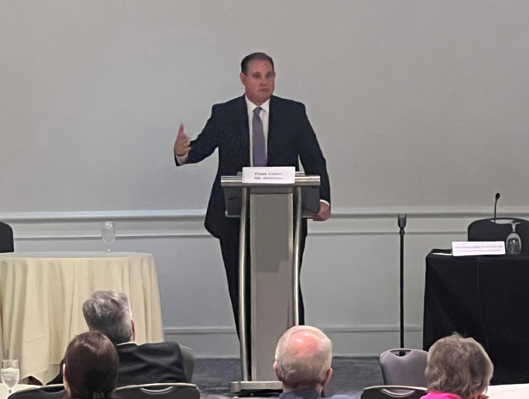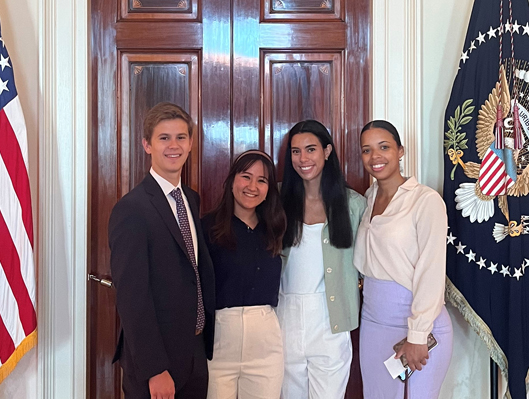Hill to Hill — Policy & Political Developments in Washington, DC and Boston, MA
ML Strategies is pleased to present the latest edition of our new quarterly newsletter, Hill to Hill, capturing recent policy and political developments in Washington, DC and Boston, MA.
Federal Update
Risk of Shutdown Continues Despite Bipartisan Debt Ceiling Agreement
The second quarter of 2023 saw Congress and the Biden administration go just up to the brink of the first-ever default by the US government over House Republicans’ objections to federal spending levels. But following a marathon round of negotiations and compromise, economic catastrophe was averted with bipartisan approval of the Fiscal Responsibility Act (FRA). The bill keeps funding for nondefense programs relatively flat and provides a three percent increase in defense spending for FY24. Under the agreement, both defense and nondefense spending will increase by one percent in FY25. Congressional appropriators will be bound by these spending limits over the next two years. Subsequent years are not subject to any funding caps under the FRA.
The bill also addressed energy permitting reform by making reforms to the National Environmental Policy Act (NEPA), including changes to project threshold, interagency review deadlines to speed the process, and limits on what qualifies as a major action. Further, the FRA codifies the end of the pause in student loan repayment and requires the administration to resume payment and interest collections in late August 2023. It also imposes work requirements on more individuals receiving SNAP benefits and makes changes to the TANF program.
The final House vote for the FRA was 314–114, and in the Senate, the vote was 63–36.
While the final tallies were strongly bipartisan, members of the House Freedom Caucus did not support the agreement and eventually exerted their power by refusing to allow the House to advance other non-related measures. In response, Speaker McCarthy has reached an agreement with the most conservative members of the Republican caucus to advance an additional $120 billion in Fiscal Year 2024 spending cuts than those agreed to in the FRA. The new spending proposal funds discretionary government accounts at $1.47 trillion next year rather than the $1.59 trillion allowed by the FRA. With Senate Democrats saying they will fund at the levels agreed upon in the FRA and House Democrats balking at voting for spending levels lower than what they just supported in the FRA, the nation faces a potential shutdown of the federal government at the start of the next fiscal year on October 1. On top of that scenario, layer in the fact that the FRA requires that if final appropriations for the next fiscal year are not made by January 1, spending will be capped at 99 percent of current levels with a government-wide spending cut of one percent. This government-wide spending cap includes defense spending, which would be anathema to many in Congress, especially Republicans.
The fight over spending will dominate the congressional agenda for the month of July and then in September when Congress returns from the annual August recess when lawmakers are away from the Capitol for the entire month.
Rollout of Bipartisan Infrastructure Law and Inflation Reduction Act Continues
With the Biden administration aggressively rolling out the Bipartisan Infrastructure Law and the Inflation Reduction Act, ML Strategies and Mintz recently launched our new Energy Funding Matrix to track the many grants, loans, and financing opportunities for clean energy in these two landmark laws. The matrix is updated on a bi-weekly basis. For more on the latest developments for these bills and other energy-related efforts, check out our monthly Energy and Sustainability Washington Update.
Massachusetts Update
Money Talks on Beacon Hill
As Fiscal Year 2023 draws to a close, the Massachusetts State Legislature is hard at work to send a conference committee report on FY2024 budgetary allocations to Governor Healey’s desk for review and signature. The FY2024 Budget Conference Committee has been working since early June to iron out the differences between the House and Senate final budgets to fund policy initiatives across the Commonwealth — and to keep the lights on in Massachusetts agencies and departments. As expected, familiar faces were chosen to lead deliberation on behalf of the House and Senate Committees on Ways and Means. House conferees are as follows: Chairman Aaron Michlewitz, Vice Chair Ann-Margaret Ferrante, and Ranking Minority Member Todd Smola. Senate conferees are as follows: Chairman Michael Rodrigues, Vice Chair Cindy Friedman, and Ranking Minority Member Patrick O’Connor.
On Monday, June 26, the legislature adopted a “1/12th budget,” which authorized another month of funding for state government services as conferees work to send a final budget to the governor. The legislature passed a $6.66 billion interim budget (exactly as filed by Gov. Healey) to carry the Commonwealth into July when House and Senate conferees hope to have a final agreement on spending for FY24. The use of a 1/12th budget is not new — this has been a fairly customary procedure over the last several fiscal years, allowing conferees the time to thoughtfully discuss policy and monetary measures within the two budgets to ensure the residents of the Commonwealth are provided adequate funding to support important functions of Massachusetts’ government.
Tax Relief Is Top of Mind
The FY2024 budget is not the only piece of legislation in a Conference Committee this year. The House and Senate are also deliberating over a tax relief package, which could bring about relief for lower- and middle-income households across the Commonwealth. The House and Senate, based on recent reporting, still seem to be in opposite corners on several key issues within their respective chambers’ legislation, including provisions relative to the state’s estate tax, short-term capital gains, Chapter 62F refunds, and the implementation of the single sales factor. Members deliberating provisions within the tax relief packages include the following: House conferees — HWM Chair Aaron Michlewitz, House Revenue Chair Mark Cusack and Rep. Michael Soter; Senate conferees — SWM Chair Michael Rodrigues, Senate Revenue Chair Susan Moran, and Sen. Bruce Tarr.
Governor Healey Completes Her Cabinet with Addition of Housing Secretary
On Thursday, June 1, Gov. Healey swore in Executive Office of Housing and Livable Communities Secretary, Ed Augustus, to fill the last empty seat in the first-term governor’s cabinet. Secretary Augustus is no stranger to Beacon Hill, though. The Secretary served in the state Senate, representing Worcester, from 2005 to 2008, which will surely positively impact his time in the State House and his office’s goal of facilitating more housing, faster. Housing has been a foundational tenant of Gov. Healey’s campaign and remains a policy priority of her administration in Massachusetts. In line with that goal, affordable housing, protections for renters and Massachusetts’ aging population, and the transition of housing infrastructure to renewable energy are hot topics in the Commonwealth’s leaders’ day-to-day discussions, which the team at ML Strategies is happy to be helpful with.
Around ML Strategies
The Washington office of ML Strategies recently hosted a reception for the Digital Therapeutics Alliance, which brings together industry leaders, health care providers, patient advocates, and other stakeholders to promote the understanding and use of digital therapeutics.
 |
||
 |
||
 |
Anthony DeMaio, Vice President in our Washington office, hosted a fundraiser for Rep. Jim McGovern (D-MA), who is the senior Democrat on the Rules Committee, which sets the terms of debate for legislation considered on the floor of the House, and senior member of the Agriculture Committee. To learn more about Rep. McGovern, read this article in The New Yorker.
With artificial intelligence (AI) quickly becoming one of the hottest topics for public policy, ML Strategies and Mintz have launched a new weekly newsletter, AI: The Washington Report. The accelerating advances in artificial intelligence (“AI”) and the practical, legal, and policy issues AI creates understandably have exponentially increased the federal government’s interest in AI and its implications. In our weekly reports, we hope to keep our clients and friends abreast of that Washington-focused set of potential legislative, executive, and regulatory activities. Other Mintz and ML Strategies subject matter experts will continue to discuss and analyze other aspects of what could be characterized as the “AI Revolution.” The newsletters can be found in the ML Strategies Insights Center.
In April, ML Strategies was pleased to welcome our client NAHEFFA — the National Association of Health and Educational Facilities Finance Authorities — to Washington for its annual spring conference. NAHEFFA is made up of 40 state finance authorities that serve as conduit issuers of tax-exempt municipal bonds for nonprofit health care and higher ed institutions. Along with an overview of the national political scene from our own Frank Guinta, we arranged for conference attendees to hear from Rep. Terri Sewell (D-AL) about her work on Capitol Hill in support of tax-exempt municipal bonds, as well as from the staff of Reps. Dutch Ruppersberger (D-MD) and David Kustoff (R-TN) about recently introduced legislation to restore tax code language allowing for advance refunding of tax-exempt municipal bonds. We also brought in representatives from the National Association of College and University Business Officers and the Government Finance Officers Association about their work on municipal bonds, ESG, and other federal issues.
 |
||
 |
Alongside the NAHEFFA conference, we were also very pleased to host a networking mixer for Muni Pride, a new national professional networking organization made up of members of the LGBTQIA+ community working in the public finance sector. Attending were a number of NAHEFFA members, bond professionals from Washington and across the country, as well as Meghan Burke, chair of the Public Finance Practice at Mintz.
 |
Pamela Mejia, Sr. Manager in our Washington office, brought our outstanding team of summer interns on a tour of the White House last month.
 |
